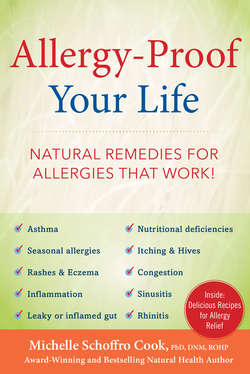Читать книгу Allergy-Proof Your Life - Michelle Schoffro Cook - Страница 23
На сайте Литреса книга снята с продажи.
THE DAIRY DILEMMA
ОглавлениеForget what dairy marketing bureaus would have you believe—dairy is not the health food it has been touted as. When it comes to seasonal and environmental allergies, I have found that dairy products are one of the worst culprits. It may seem like an unusual connection, but I have observed the disappearance of allergies in countless clients over the past twenty-five years when they follow a dairy-free and low-sugar diet plan. For most people, these two simple dietary changes are sufficient to eliminate seasonal allergies as long as this type of diet is followed. Let’s explore some of the problems with dairy products.
Dairy products are highly mucus forming and can contribute to a whole host of respiratory conditions, including nasal and sinus congestion as well as lung troubles like asthma. Milk and other dairy products tend to be difficult to digest. Baby cows that drink their mother’s milk have four times the stomach capacity as humans, but most humans struggle with the digestion of dairy products. Most people assume that only those who have symptoms of lactose intolerance have difficulty digesting dairy products, but there are many other symptoms linked to their digestion, including indigestion, heartburn, abdominal cramps, aching joints, sinus troubles, nasal congestion, arthritis, and many others.
As if cow’s milk wasn’t hard enough to digest, most milk is homogenized, which denatures the milk’s proteins, making it even harder to digest. Many peoples’ bodies react to these proteins as though they are “foreign invaders” causing their immune systems to overreact. Research also links homogenized milk to heart disease. Additionally, during this homogenization process all the enzymes that help digest milk are destroyed. Further, any beneficial bacteria that would have predigested the milk products, making them easier for us to digest, are also killed.
But difficulty digesting proteins isn’t the only issue. Due to our commercialization processes involved in the growth of dairy cows, many foreign substances find their way into the cows and are then passed along to the milk they produce, which ultimately end up in our bodies when we drink or eat products made with milk. Pesticides in cow feed find their way into milk and dairy products that we consume. Not only are the naturally present hormones in cow’s milk stronger than human hormones, throwing off our delicate hormone balance, but the animals are routinely given synthetic hormones to plump them up and increase milk production. These hormones further throw off our hormonal balance.
As soon as I tell people to stop eating dairy products, they inevitably ask me, “But how will I get my calcium?” We have been duped into thinking that dairy products equal calcium in the same way we think meat equals protein. Although dairy products are undoubtedly high in calcium, dairy products are difficult to digest, which means that we actually absorb very little of the calcium found in these products. The calcium found in plant-based foods is far superior to dairy products because it is much easier to digest and absorb.
Before you panic about increasing your risk of osteoporosis if you give up dairy products, you might be surprised to learn that research shows that the countries whose citizens consume the most dairy products have the highest incidence of osteoporosis, with Americans and Canadians having some of the highest rates of the disease. Some of the foods that have high amounts of highly absorbable calcium include almonds, almond butter, broccoli, carrot juice, carrots, dark leafy greens, kale, kelp, navy beans, oats, sesame seeds, sesame butter (tahini), soymilk and tofu (organic only, as soy is heavily contaminated by genetically modified organisms, or GMOs), wild salmon, and sardines.
Replace dairy products like milk, cream, butter, ice cream, and cheese with dairy-free beverages like almond or coconut milk or cashew or coconut cream, coconut butter or a vegan butter substitute instead of butter, and cashew- or coconut-based ice creams. Additionally, there are many excellent dairy-free cheeses now on the market. Avoid ones with casein, which is a dairy product derivative that is mucus forming and difficult to digest. Many of today’s vegan cheeses are delicious, artisanal options that are far from the original ones that hit the market decades ago. So if you haven’t tried them lately, you might want to explore dairy-free cheeses. Also, there are a wide variety of styles and tastes, so if you don’t like one, try a different variety.
